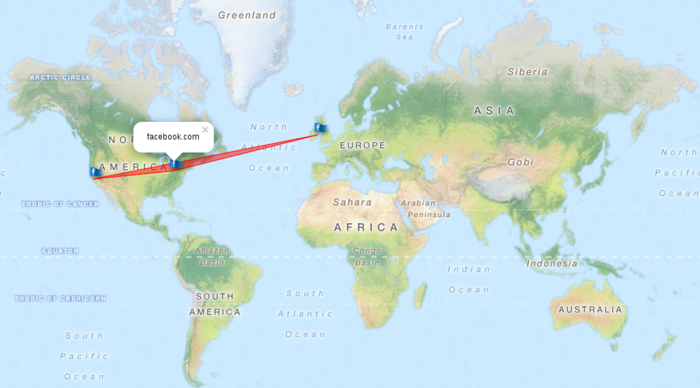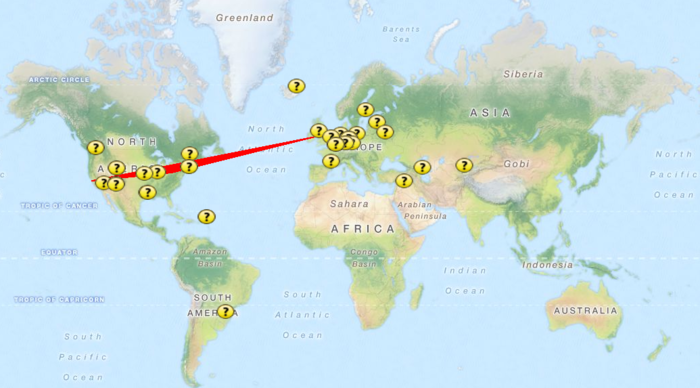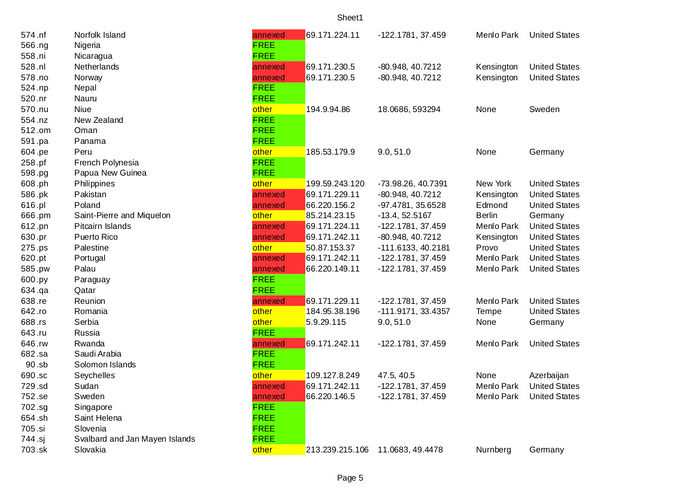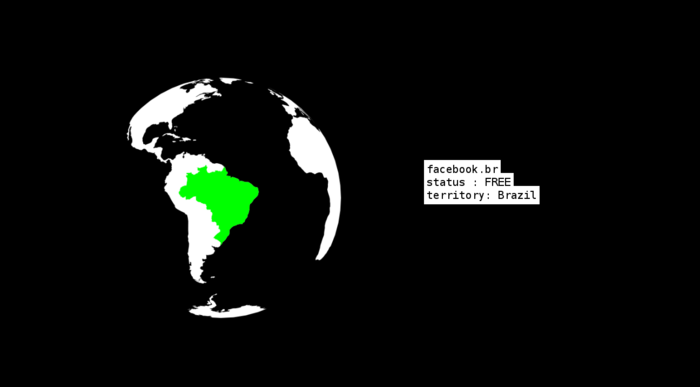User:Jules/domainsgeofrontiers: Difference between revisions
No edit summary |
No edit summary |
||
| (One intermediate revision by the same user not shown) | |||
| Line 1: | Line 1: | ||
<div style="width:60%"> | <div style="width:60%"> | ||
While making an application to retrieve pictures associated with websites on the basis of the geolocation, I realised that some big websites could come up with different locations on the basis of the url I typed. | While making an application to retrieve pictures associated with websites on the basis of the geolocation, I realised that some big websites could come up with different locations on the basis of the url I typed.<br /> | ||
{ | { | ||
| Line 29: | Line 30: | ||
'country_name': ' Ireland ', | 'country_name': ' Ireland ', | ||
'continent': ' EU ' | 'continent': ' EU ' | ||
} | }<br /> | ||
I looked a bit more into facebook because I remembered some article I read about its European data centers, based in Ireland.<br /> | |||
[[File:Facebookdotcom.png|700px]] <br /> | |||
<small> ''Three first accurate positions I could map, see: http://s192400.gridserver.com/limitsoftheempire/flatmap/facebookdotcom.html''</small><br /> | |||
Then I tested all the potential country extensions for facebook urls, using the Country code top-level domains list from wikipedia <ref>https://en.wikipedia.org/wiki/List_of_Internet_top-level_domains#Country_code_top-level_domains</ref>. Some things are very interesting about this list. For instance the fact that .su (Soviet Union) is still in use. | |||
I exported all the relevant data for the existing domains as a json file for quick mapping. <br /> | |||
[[File:Facebookdotother.png|700px]] <br /> | |||
<small> ''A lot of interrogation marks there: http://s192400.gridserver.com/limitsoftheempire/flatmap/facebookdotother.html''</small><br /> | |||
What was interesting to me was that, when ever a URL would get located on its own in a country outside the USA's borders, it would look like an anomaly, and mostly confirmed not belonging to Facebook. In other words, the geo-checking of facebook urls enabled me to identify the domain's owner identity.<br /> | |||
[[File:Facebookidcheck.jpg|700px]] <br /> | |||
I also exported the Libre Calc spreadsheet<ref>https://pzwiki.wdka.nl/mw-mediadesign/images/f/fb/Facebookcountrylevel.pdf</ref> as a csv for d3.js experiments. <br /> | |||
[[File:Facebookglobebrazil.png|700px]] <br /> | |||
Here it is : <br /><br /> | |||
''http://s192400.gridserver.com/limitsoftheempire/globalview/'' <br /> | |||
<br /> | |||
</div> | </div> | ||
Latest revision as of 11:17, 9 December 2015
While making an application to retrieve pictures associated with websites on the basis of the geolocation, I realised that some big websites could come up with different locations on the basis of the url I typed.
{
'website': ' facebook.fr ',
'city': ' Menlo Park ',
'time_zone': ' America/Los_Angeles ',
'longitude ':' -122.1781 ',
'latitude': ' 37.459 ',
'country_code': ' US ',
'country_name': ' United States ',
'continent': ' NA '
},{
'website': ' facebook.com ',
'city': ' Kensington ',
'time_zone': ' America/New_York ',
'longitude ':' -80.948 ',
'latitude': ' 40.7212 ',
'country_code': ' US ',
'country_name': ' United States ',
'continent': ' NA '
},{
'website': ' www.facebook.com ',
'city': ' None ',
'time_zone': ' Europe/Dublin ',
'longitude ':' -6.2597 ',
'latitude': ' 53.3478 ',
'country_code': ' IE ',
'country_name': ' Ireland ',
'continent': ' EU '
}
I looked a bit more into facebook because I remembered some article I read about its European data centers, based in Ireland.

Three first accurate positions I could map, see: http://s192400.gridserver.com/limitsoftheempire/flatmap/facebookdotcom.html
Then I tested all the potential country extensions for facebook urls, using the Country code top-level domains list from wikipedia [1]. Some things are very interesting about this list. For instance the fact that .su (Soviet Union) is still in use.
I exported all the relevant data for the existing domains as a json file for quick mapping.

A lot of interrogation marks there: http://s192400.gridserver.com/limitsoftheempire/flatmap/facebookdotother.html
What was interesting to me was that, when ever a URL would get located on its own in a country outside the USA's borders, it would look like an anomaly, and mostly confirmed not belonging to Facebook. In other words, the geo-checking of facebook urls enabled me to identify the domain's owner identity.
I also exported the Libre Calc spreadsheet[2] as a csv for d3.js experiments.
Here it is :
http://s192400.gridserver.com/limitsoftheempire/globalview/


